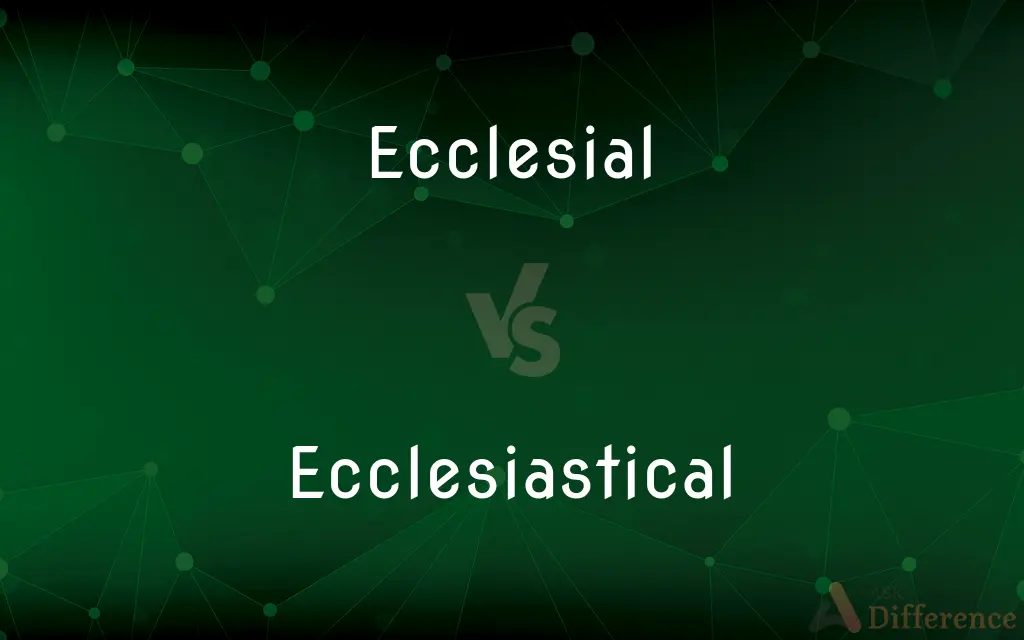Ecclesial vs. Ecclesiastical — What's the Difference?
By Tayyaba Rehman & Maham Liaqat — Updated on March 19, 2024
Ecclesial refers to anything pertaining to a church or its congregation, while ecclesiastical is broader, encompassing all matters related to the Christian church, its clergy, and its organization.

Difference Between Ecclesial and Ecclesiastical
Table of Contents
ADVERTISEMENT
Key Differences
The term "ecclesial" specifically relates to the church as a community or congregation of believers. It focuses on aspects that concern the gathering of individuals for worship, fellowship, and the practice of religious beliefs within the context of a church setting. Ecclesial matters often deal with the communal and spiritual life of the church members. "Ecclesiastical," on the other hand, encompasses a wider range of matters related to the Christian church as an institution. This includes its clergy, doctrines, liturgical practices, and administrative aspects. Ecclesiastical matters extend to the governance of the church, the roles of bishops, priests, and deacons, and the church's interaction with wider society and other religious bodies.
While ecclesial aspects are primarily concerned with the life and activities of the church community, ecclesiastical matters delve into the formal and institutional side of the church, including its hierarchy, canon law, and theological doctrines.
The distinction also reflects in the language used; "ecclesial" is often used when discussing the church in terms of its being a community of believers, whereas "ecclesiastical" is used in contexts that involve the church's formal, institutional, or clerical aspects.
Understanding the difference between ecclesial and ecclesiastical is crucial for comprehending discussions on church governance, community life, and the roles within the church. While ecclesial matters touch on the grassroots level of church life, ecclesiastical aspects cover the structured, organizational side.
Comparison Chart
Focus
Church community and congregation
Church institution, clergy, and organization
ADVERTISEMENT
Concerns
Worship, fellowship, communal life
Governance, clergy roles, doctrines
Context
Spiritual and communal activities
Formal, institutional aspects of the church
Usage
Community and believer-centric discussions
Institutional, clerical, and doctrinal discussions
Examples
Community services, group prayers
Canon law, liturgical practices, clerical duties
Compare with Definitions
Ecclesial
Concerned with the spiritual growth and support of the congregation.
The church's ecclesial programs offered various spiritual retreats and workshops.
Ecclesiastical
Related to the administration and organization of the church.
The ecclesiastical authority was responsible for appointing new clergy members to the diocese.
Ecclesial
Pertaining to the church as a community of believers.
The ecclesial gathering emphasized the importance of fellowship among church members.
Ecclesiastical
Concerns the roles, duties, and life of the clergy.
The ecclesiastical dress code specified the attire to be worn during liturgical services.
Ecclesial
Relating to the worship activities within the church.
The ecclesial traditions of the congregation included unique hymns and prayers.
Ecclesiastical
Pertains to the laws and regulations governing church affairs.
The ecclesiastical court dealt with matters in violation of canonical law.
Ecclesial
Involvement and participation of church members in communal life.
The ecclesial leadership encouraged active engagement in community outreach programs.
Ecclesiastical
Relates to the official teachings and beliefs of the church.
The ecclesiastical documents outlined the church's stance on various theological issues.
Ecclesial
Activities and functions organized for and by the church community.
The ecclesial picnic brought together families from various parts of the city.
Ecclesiastical
Involves the formal worship practices and rituals of the church.
The ecclesiastical calendar dictated the observance of holy days and seasons.
Ecclesial
Alternative form of ecclesiastical
Ecclesiastical
Of or relating to a church, especially as an organized institution.
Ecclesial
Ecclesiastical.
Ecclesiastical
Appropriate to a church or to use in a church
Ecclesiastical architecture.
Ecclesiastical robes.
Ecclesiastical
Of or pertaining to the church.
Ecclesiastical architecture
Ecclesiastical
Of or pertaining to the church; relating to the organization or government of the church; not secular; as, ecclesiastical affairs or history; ecclesiastical courts.
Every circumstance of ecclesiastical order and discipline was an abomination.
Ecclesiastical
Of or associated with a church (especially a Christian Church);
Ecclesiastic history
Common Curiosities
Is "ecclesial" only used for Christian contexts?
Primarily, yes, "ecclesial" is used within Christian contexts to refer to matters concerning the church community.
How do ecclesiastical laws affect the average churchgoer?
Ecclesiastical laws primarily govern the church's internal administration and clergy, but they can also affect laypersons, especially regarding marriage, sacraments, and church membership requirements.
Can "ecclesiastical" refer to non-Christian religious institutions?
While "ecclesiastical" is typically associated with Christian institutions, its usage can sometimes extend metaphorically to similar institutions in other religions.
Is the distinction between ecclesial and ecclesiastical recognized universally?
While the distinction is commonly understood in theological and church-related discussions, laypersons might use the terms more interchangeably.
Who has authority over ecclesiastical matters?
Ecclesiastical authority typically rests with the church hierarchy, including bishops, synods, and church councils, depending on the denomination.
Are all church-related matters considered ecclesiastical?
Most church-related matters can be described as ecclesiastical, especially if they pertain to its governance, clergy, and organization. However, aspects that solely concern the lay congregation's communal life are more specifically ecclesial.
Are ecclesial leaders also involved in ecclesiastical matters?
While ecclesial leaders, like lay ministers and community leaders, primarily focus on the congregational aspect, they may also engage in ecclesiastical matters, especially those affecting their community.
Can a church activity be both ecclesial and ecclesiastical?
Yes, some church activities might encompass both ecclesial and ecclesiastical aspects, especially if they involve both community engagement and formal liturgical or doctrinal elements.
Can ecclesial communities exist independently of ecclesiastical structures?
Ecclesial communities can function independently, focusing on spiritual growth and fellowship, but they often remain connected to larger ecclesiastical structures for doctrinal unity and support.
Can ecclesial activities influence ecclesiastical decisions?
Yes, the needs and practices of the church community (ecclesial) can influence ecclesiastical decisions, especially when they pertain to pastoral care and community engagement.
How do ecclesiastical changes impact ecclesial practices?
Changes in ecclesiastical policies or leadership can directly impact ecclesial practices by altering liturgical guidelines, community engagement approaches, or theological emphasis.
Do ecclesiastical roles always involve clergy?
While ecclesiastical roles often involve clergy, laypersons can also hold certain ecclesiastical positions, particularly in administrative and educational capacities within the church.
Share Your Discovery

Previous Comparison
Multivibrator vs. Oscillator
Next Comparison
Apache vs. HttpdAuthor Spotlight
Written by
Tayyaba RehmanTayyaba Rehman is a distinguished writer, currently serving as a primary contributor to askdifference.com. As a researcher in semantics and etymology, Tayyaba's passion for the complexity of languages and their distinctions has found a perfect home on the platform. Tayyaba delves into the intricacies of language, distinguishing between commonly confused words and phrases, thereby providing clarity for readers worldwide.
Co-written by
Maham Liaqat















































